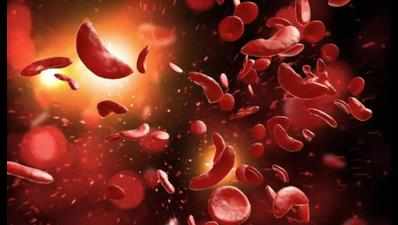Trending
Some Vidarbha districts contribute to 70% of sickle cell cases in Maharashtra
Maharashtra health department plans to conduct 38 lakh tests for genetic mutations in 21 vulnerable districts to check for sickle cell disease, especially targeting those aged 0-40 in tribal areas.

Representative Image
The test would be conducted for those between 0 and 40 years, especially those living in the tribal belt. June 19 is considered the World Sickle Cell Day to increase awareness about the disease across the world.A sickle cell-diseased person’s red blood cells become ‘sickle’ shaped due to genetic mutation. These cells are unable to bend or move easily, so can block blood flow to the rest of the body.

As of now, there is no treatment for this condition. However, doctors working with the tribal population ensure that medications are provided for lifetime to suppress the symptoms and complications. The health department also counsels and tests potential fertile couples and pregnant mothers to undergo tests for detection of genetic mutation and recommend termination of pregnancy if the foetus is detected with the mutation. As per the state health department, there are 16,413 sickle cell patients of whom a majority are from the Vidarbha region. Of the 34.80 lakh people screened, 1.23 lakh are carriers of sickle cell disease genes but do not have the condition.
Dr Mahendra Kendre, assistant director (blood cell) of the state’s directorate of health services said, “On the occasion of World Sickle Cell Day, we have planned district-level activities, including sickle cell screening, counselling and awareness activities. We have multiple activities throughout the year to create awareness of the issue, especially in areas with a vulnerable population.”
However, doctors who regularly treat sickle cell patients in Maharashtra said that more efforts are needed to increase awareness about the disease. Dr. Shailesh Pande, a medical geneticist working with ICMR-National Institute for Research in Reproductive and Child Health (ICMR-NIRRCH), said, “Screening tests for abnormal haemoglobin studies are available but it seems that these tests are not effectively implemented in the community. Pre-marital and preconception screening will help to identify high-risk group..”
Dr Gaurav Kharya, director, Centre for Bone Marrow Transplant and Cellular Therapy, Indraprastha Apollo Hospital, New Delhi, said, “Despite these efforts, patients still face many health and social challenges due to limited healthcare access in remote areas and the stigma associated with the disease. The good thing is that these efforts have raised awareness about the disease, and now patients are seeking timely treatment and even considering curative options like bone marrow transplant.”
End of Article
FOLLOW US ON SOCIAL MEDIA











